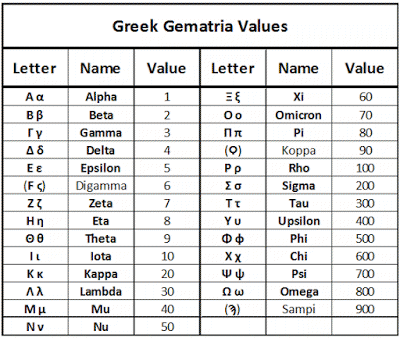Gematria – The Foundation of a Code
“Good order is the foundation of all things.”
Edmund Burke
Have you ever wondered why the alphabet is in the order that it is? If you are like most, the answer is probably not. Even from a young age, the order of the letters always bothered me. Why not order the alphabet so that the vowels and consonants are separated into groups? It would make learning the vowels and consonants easier. Why not arrange the letters of the alphabet depending on how frequently the letters are used in the language or in the order they are placed on a typewriter or computer keyboard? The answer is that a secret language would be lost if the order of the letters ever changed.
Since the beginning of human civilization, a code has existed. This code crosses languages and cultures. It has probably been known by many names over the centuries, but the modern name for it is ‘Gematria’. It can be dated back to the time of the Babylonians, but the Hebrews were the ones who made the most use of it. They believed that language was a gift from God, and that although humans created the many languages of the world, these languages were not created simply at random. They believed that language was inspired by God and that He could place hidden messages within the fabric of the language itself. The letters that make up the language and the way words are spelled are not simply a random event. The letters, words, and even spelling of the words were all inspired by God. The work of man, yes, but guided by God.
The concept of gematria is simple, but its use and the process of decoding the messages can be a daunting task. Some critics would argue that it is not a code at all, but merely coincidence. No matter how difficult or obscure the code may appear, there is no doubt that the method can be used to hide secrets if a person so desires.
Gematria will work in any phonetically based language, i.e., any language that is based on letters and words, as opposed to pictorial or symbolic languages. The basis of gematria is numerical. Any phonetic language can be broken down into a numerical language, simply by assigning a number to each letter of the alphabet. Once a value has been assigned to a given letter, the value of that letter will not change in that version of gematria. After establishing a numerical system for the alphabet, the values of the individual letters are used to obtain a total value for words and phrases, simply by adding the values of the constituent letters together. Practitioners of gematria believed that hidden messages from God could be found in the language by identifying words or phrases that have the same value. When two words are identified with the same value, the meaning of one or both of those words can be redefined as the other.
Obviously, there are an almost infinite number of ways to set the code up, depending on the numbers assigned to each letter. In the English language there are two primary methods for numbering the alphabet, one is ‘standard’ and the other is ‘simple’. In the standard method, the alphabet is numbered from A=1 to Z=26. The simple method numbers the alphabet from A=1 to Z=24, with I=J=9 and U=V=20. Table 1 shows the letter values for both systems. The standard and simple values of some important words and phrases that will be of use are shown in Table 2.
As stated earlier, gematria is a coding technique that can be made to work in any phonetically based language. In the Greek language, the code was called Isopsephy. Until Arabic numerals were adopted and adapted from Indian numerals in the 8th and 9th century AD, and promoted in Europe by Fibonacci of Pisa with his 1202 book Liber Abaci, numerals were predominantly alphabetical. For instance in Ancient Greece, Greek numerals were created using the entire Greek alphabet. It is just a short step from using letters of the alphabet in everyday arithmetic and mathematics to seeing numbers in words, and to writing with an awareness of the numerical dimension of the words, and then just another short step to building codes using the fact that letters and/or words can become numbers.
One of the more common forms of gematria in the Greek language produces the value 888 for the Greek form of JESUS, which is,
‘ΙHΣΟΥΣ’ = 888
The values of the name of Jesus in English and Greek will play an important role in discovering the location of the Holy Grail, and in decoding the hidden secrets of the King James Bible.



